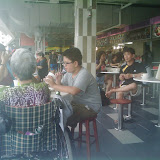Of course, to recoup that investment, the majority of the floor area is devoted to cooked food stalls. The much anticipated wet market takes up only about a fifth of the total floor area in this food establishment - something quite different from what the tender document called for. Clearly the wet market is a sideshow, probably not able to financially sustain the sky-high rental Kopitiam has to pay the government each month. I suppose the cook food stall business is a very profitable one. The prices of the food items are slightly lower than equivalent food stalls situated just across the road in Compass Point. But when we compensate for the lack of air-condition, this newest food centre's prices comes up to roughly the same as the air-conditioned one. The food assortment is more or less the same. There are many more cooked food stalls (for example, there are 3 stalls selling chicken rice). The convenience factor cannot be matched both for customers and for Kopitiam though. This is because it can operate for longer hours compared to the one in the shopping mall, and it can collect parking fees too. So I suppose it'll be profitable for Kopitiam though some cooked food stall operators in Kopitiam's Compass Point location have expressed the concern of cannibalisation of their businesses. But this is of no concern to Kopitiam because they will collect the same rents at both places anyway.
What is my feeling about this food centre? For one, I am underwhelmed. Really, for the real estate it occupies, it is more of the same thing,which makes Sengkang Square that much less attractive. Its single floor design is really a waste of land. And for the excitement it evoked when a wet market was first announced, the actual space devoted to it is really insignificant and a let down of sorts. I get the feeling that wet markets are not in fact all that popular, not what a small but vocal minority makes them out to be. Kopitiam realises this and probably did the right thing by relegating it to a sideshow.
I also don't like the fact that Kopitiam is operating major food establishments on both sides of the road. What benefit can consumers look forward to in terms of lower food prices, better customer service and more responsive operators? Zilch, numero zero, ling dan. Nope, life has not improved with this latest of commercial ventures blessed by no less than the government. One is left to rue what could have been if the operator with the second best bid had secured the contract to operate this business. The government should reflect on its 'it is a commercial decision' mentality. The government's business is to help the people lower cost of living, and not to improve the bottom line of businesses, particularly when it concerns what should have been a lower cost of eating and going to the market, given its budget/no-frills design.
 |
| Kopitiam Sengkang |




